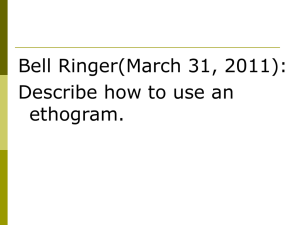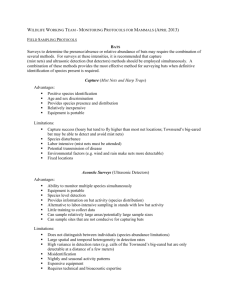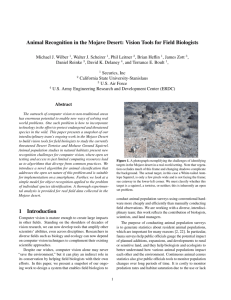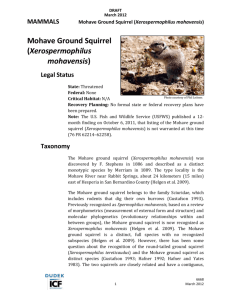CS_537_Squirrel_Programming
advertisement
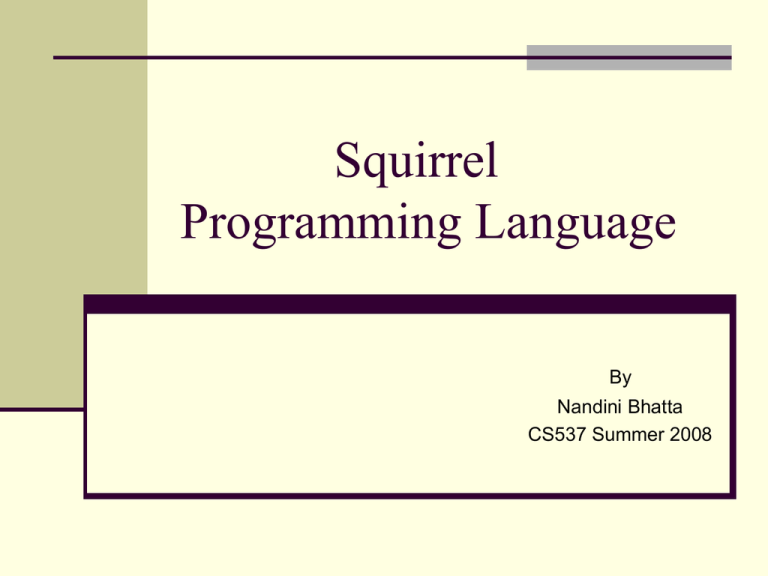
Squirrel
Programming Language
By
Nandini Bhatta
CS537 Summer 2008
Contents
Introduction
Introduction
Started in the year 2003
High level OO programming language
Light weight programming language featuring higher-
order functions, classes/inheritance
Powerful scripting tool that fits in the size, memory
bandwidth
Real-time requirements of applications like games
It has a C-like syntax
Features
Open Source
Inheritance
Exception Handling
Polymorphism
Compiles on both 32-bit & 64-bit architectures
Tail Recursion
Dymanic Typing
Automatic memory management
Development State
Two versions : 1.01 & 2.2.1
The current stable release is 2.2.1
It can be Compiled and run on Windows and Linux
Squirrel is known to run also on MacOS X,
GameCube, PSP and XBOX
Keywords & Operators
Similar to keywords & operators in Java
Keyword examples : case, catch, class,
constructor, parent, yield, while, return, resume, null
default, delegate, delete, else, enum, switch, true,
false, throw, try….
Operators examples : ! ,!=, ||, ==, &&, <=, => >, +
+,/ , /=, *, *=, %, %=, ++, --, <-, =, &, ^………
Data types
Squirrel is a dynamically typed language so
variables have no types
They refer to a value that does not have a
type
Squirrel basic types include integer, float, string,
null, table, array, function, generator, class, instance,
Boolean
Functions, Class & Class instance
Functions similar to those in C language
Classes created through class expression or class
statement.
Class members are inherited from another class
object at creation time.
After creation, members can be added until an
instance of the class is created.
Variables
Two types of variables in squirrel : local and global
variables.
Global variables stored in tables and hence referred
to as table slots
Local & Global variables….
Squirrel first checks if an identifier is local variable (function arguments)
If not it checks if it is a member of the environment object (this)
For example :
function testy(arg)
{
local a=10;
print(a);
return arg;
}
will access to local variable 'a' and prints 10.
function testy(arg)
{
local a=10;
return arg+foo;
}
In this case ’foo’ is treated as ‘this.foo’
Global variables
Global variables are stored in root table
Environment object is the root table
To explicitly access global table from another scope,
the slot name must be pre fixed with ‘::’
Example: Accessing global variable
To access global variable ‘foo’
function testy(arg)
{
local a=10;
return arg +::foo;
}
Squirrel statements
Squirrel program is a simple sequence of statements
Squirrel statements are similar to C statements such
as assignment, function calls, program flow control
structures etc.
Statements can be separated with new lines or using
‘;’
stats := stat [';'|'\n'] stats
Function declaration
Syntax:
funcname := id [ '::' id]
stat:= 'function' id [ '::' id]+ '(' args ')'[ ':' '(' args ')'] stat
Example:
T <- { }
function T::ciao(a,b,c)
{
return a+b-c;
}
Class declaration
To create a new class :
Syntax:
memberdecl : = id '=' exp [ ';'] | '[ ' exp ']' '=' exp [ ';'] |
functionstat | 'constructor' stat:= 'class' derefexp
['extends' derefexp] '{'
[memberdecl]
'}‘
contd…
Example
:
class Foo {
//constructor
constructor(a)
{
testy = ["stuff",1,2,3];
}
//member function
function PrintTesty()
{
foreach(i,val in testy)
{
::print("idx = "+i+" = "+val+" \n");
}
}
//property
testy = null;
}
Array Constructor
Syntax:
exp := ‘[’ [explist] ‘]’
Example:
a <- [ ]
//creates an empty array
Arrays can be initialized with values during
the construction
Example:
a <- [1,"string!",[ ],{ }]
elements
//creates an array with 4
Groovy Vs Squirrel
Both are object oriented and dynamic languages.
Both can be used as a Scripting Language for the
Java Platform.
Groovy syntax is similar to Java where as Squirrel
syntax is similar to C.
Syntax Comparision
The following presents a side-by-side comparison of Groovy
with Squirrel:
Example 1:
Print Statement:
Groovy:
println "hello world"
Squirrel:
Local a= “hello world”;
Print (a) ;
Example 2
Groovy:
def x = 1..10
x.each{println it}
Squirrel:
local a=0;
do
{
print(a+"\n");
a+=1;
} while(a>10
Example 3
Groovy:
if (a>b)
{
assert c == a-b
println c
}
else
{
assert c == b-a
println c
}
Squirrel:
if(a>b)
{
c= a-b;
print (c);
}
else
{
c=b-a;
Print (c);
}
Inheritance Example
class Foo {
function DoSomething() {
::print("I'm the base");
}
};
class SuperFoo extends Foo {
//overridden method
function DoSomething() {
//calls the base method
::Foo.DoSomething();
::print("I'm doing something");
}
}
Work in progress
Comparision with Groovy and Java
Exploring Squirrel with game programming
Exploring Squirrel SQL database
References
www.squirrel-lang.org/doc/squirrel2.pdf
www.wikipedia.org
www.sourceforge.net
www.experiencefestival.com/squirrel_programming_l
anguage_-_syntax


